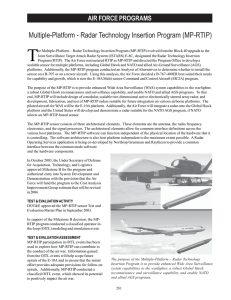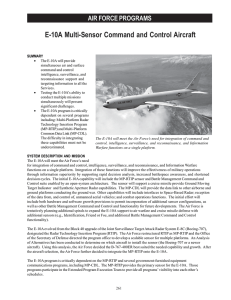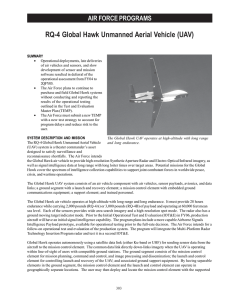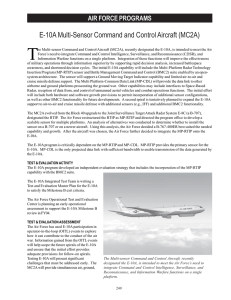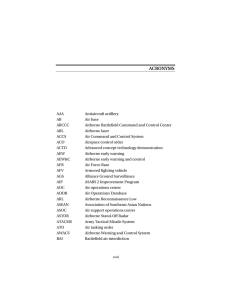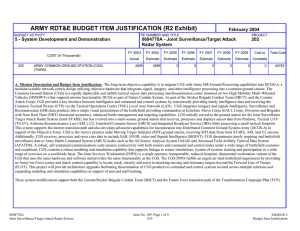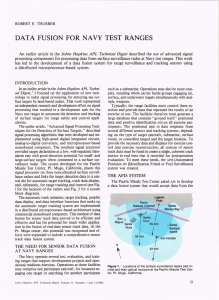Multi-Platform Radar Technology Insertion Program (MP-RTIP) AIR FORCE PROGRAMS
advertisement
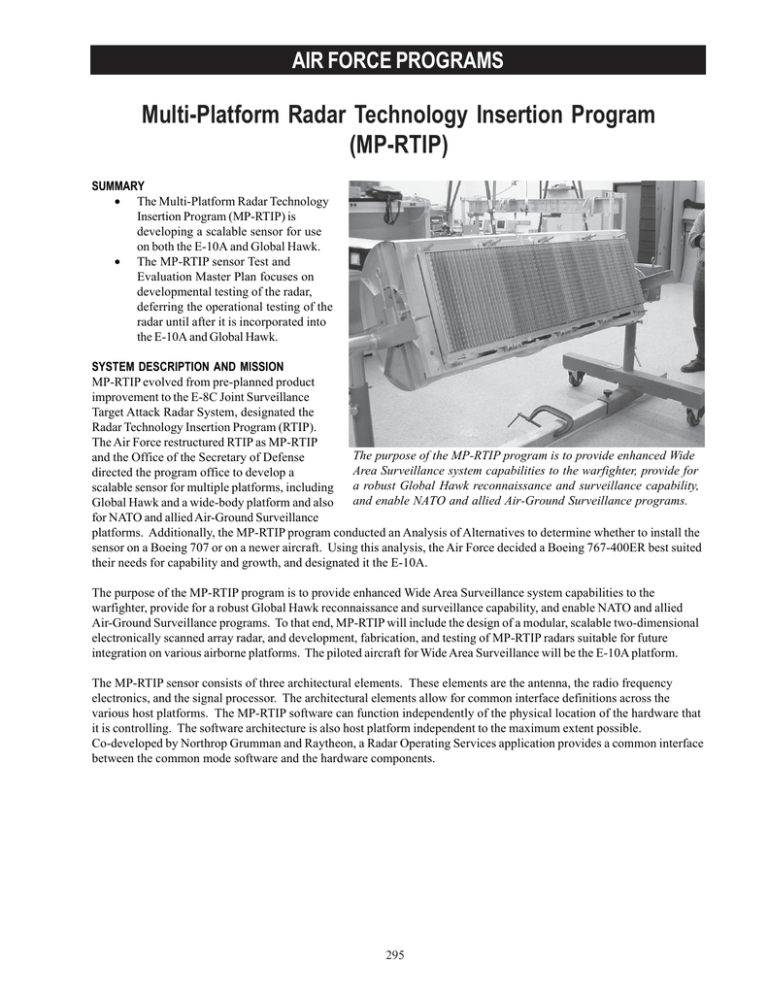
AIR FORCE PROGRAMS Multi-Platform Radar Technology Insertion Program (MP-RTIP) SUMMARY • The Multi-Platform Radar Technology Insertion Program (MP-RTIP) is developing a scalable sensor for use on both the E-10A and Global Hawk. • The MP-RTIP sensor Test and Evaluation Master Plan focuses on developmental testing of the radar, deferring the operational testing of the radar until after it is incorporated into the E-10A and Global Hawk. SYSTEM DESCRIPTION AND MISSION MP-RTIP evolved from pre-planned product improvement to the E-8C Joint Surveillance Target Attack Radar System, designated the Radar Technology Insertion Program (RTIP). The Air Force restructured RTIP as MP-RTIP The purpose of the MP-RTIP program is to provide enhanced Wide and the Office of the Secretary of Defense Area Surveillance system capabilities to the warfighter, provide for directed the program office to develop a a robust Global Hawk reconnaissance and surveillance capability, scalable sensor for multiple platforms, including and enable NATO and allied Air-Ground Surveillance programs. Global Hawk and a wide-body platform and also for NATO and allied Air-Ground Surveillance platforms. Additionally, the MP-RTIP program conducted an Analysis of Alternatives to determine whether to install the sensor on a Boeing 707 or on a newer aircraft. Using this analysis, the Air Force decided a Boeing 767-400ER best suited their needs for capability and growth, and designated it the E-10A. The purpose of the MP-RTIP program is to provide enhanced Wide Area Surveillance system capabilities to the warfighter, provide for a robust Global Hawk reconnaissance and surveillance capability, and enable NATO and allied Air-Ground Surveillance programs. To that end, MP-RTIP will include the design of a modular, scalable two-dimensional electronically scanned array radar, and development, fabrication, and testing of MP-RTIP radars suitable for future integration on various airborne platforms. The piloted aircraft for Wide Area Surveillance will be the E-10A platform. The MP-RTIP sensor consists of three architectural elements. These elements are the antenna, the radio frequency electronics, and the signal processor. The architectural elements allow for common interface definitions across the various host platforms. The MP-RTIP software can function independently of the physical location of the hardware that it is controlling. The software architecture is also host platform independent to the maximum extent possible. Co-developed by Northrop Grumman and Raytheon, a Radar Operating Services application provides a common interface between the common mode software and the hardware components. 295 AIR FORCE PROGRAMS TEST AND EVALUATION ACTIVITY In December 2003, the Under Secretary of Defense for Acquisition, Technology, and Logistics signed an Acquisition Decision Memorandum authorizing the program’s entry into System Development and Demonstration acquisition phase. After the completion of the Final Design Review for MP-RTIP, the program office updated the sensor Test and Evaluation Master Plan, as required by the Office of the Secretary of Defense. TEST AND EVALUATION ASSESSMENT MP-RTIP participation in operator-in-the loop events showed how MP-RTIP can contribute to the conduct of the air war. Information gained from the operator-in-the loop events will help scope future enhancements to the E-10A. We should not underestimate the risk associated with the interdependency of these multiple Acquisition Category 1D programs (E-10A, MP-RTIP and Global Hawk). E-10A Spiral 1 is dependent on MP-RTIP to deliver its primary sensor. MP-RTIP is dependent on E-10A to provide a test platform for the sensor. Planned delivery of the two will need close coordination to ensure neither has to wait for the delivery of the other. Due to the scope and the long lead-times required for both programs, neither will be able to tolerate interdependent developmental delays without experiencing significantly increased costs. 296
